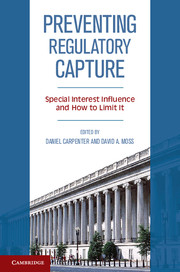Book contents
- Frontmatter
- Contents
- List of Figures
- List of Tables
- Editors
- Contributors
- Preface
- Acknowledgments
- Introduction
- Section I Failures of Capture Scholarship
- Section II New Conceptions of Capture – Mechanisms and Outcomes
- Section III Regulatory Case Studies
- 8 Capturing History
- 9 Conditional Forbearance as an Alternative to Capture
- 10 Captured by Disaster? Reinterpreting Regulatory Behavior in the Shadow of the Gulf Oil Spill
- 11 Reconsidering Agency Capture During Regulatory Policymaking
- 12 Coalitions, Autonomy, and Regulatory Bargains in Public Health Law
- Section IV The Possibility of Preventing Capture
- Conclusion
- Afterword
- Index
- References
9 - Conditional Forbearance as an Alternative to Capture
Evidence From Coal Mine Safety Regulation
Published online by Cambridge University Press: 05 June 2014
- Frontmatter
- Contents
- List of Figures
- List of Tables
- Editors
- Contributors
- Preface
- Acknowledgments
- Introduction
- Section I Failures of Capture Scholarship
- Section II New Conceptions of Capture – Mechanisms and Outcomes
- Section III Regulatory Case Studies
- 8 Capturing History
- 9 Conditional Forbearance as an Alternative to Capture
- 10 Captured by Disaster? Reinterpreting Regulatory Behavior in the Shadow of the Gulf Oil Spill
- 11 Reconsidering Agency Capture During Regulatory Policymaking
- 12 Coalitions, Autonomy, and Regulatory Bargains in Public Health Law
- Section IV The Possibility of Preventing Capture
- Conclusion
- Afterword
- Index
- References
Summary
INTRODUCTION
Regulatory agencies are often accused of offering forbearance to powerful actors within the industries they are charged with overseeing, possibly in violation of their statutory mandates and to the potential detriment of the broader public. The term bureaucratic capture is often employed as a shorthand for this phenomenon. Any attempt to construct a coherent analytical framework for understanding it, and to assess its empirical referents, however, must confront the interaction between two broad forces shaping the context in which regulators act: efforts by firms within the industry to protect and promote their economic interests and the actions of the regulators’ political superordinates.
Regulatory agencies are fundamentally complex hierarchies – chains of principal–agent relationships – consisting of many tiers of civil servants overseen by a leadership appointed by, and ultimately (more or less, depending on the extent of agency independence) responsive to, elected public officials (and, by extension, the public). At all levels of an agency's hierarchy, occupants are, to some extent, responsive to the incentives created for them by their administrative or political superordinates. To the extent that the goals of those superordinates may change, whether because the superordinates themselves have been replaced or because they have revised their regulatory goals, one may expect commensurate changes in the behavior of regulators.
Information
- Type
- Chapter
- Information
- Preventing Regulatory CaptureSpecial Interest Influence and How to Limit it, pp. 208 - 238Publisher: Cambridge University PressPrint publication year: 2013
References
Accessibility standard: Unknown
Why this information is here
This section outlines the accessibility features of this content - including support for screen readers, full keyboard navigation and high-contrast display options. This may not be relevant for you.Accessibility Information
- 4
- Cited by
